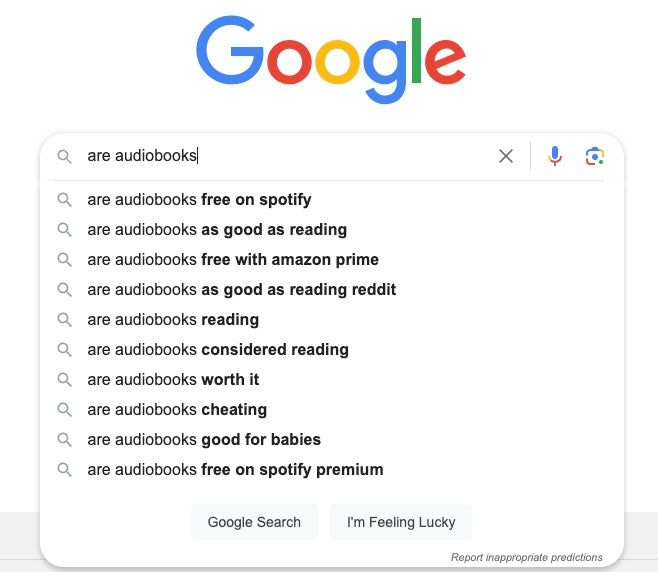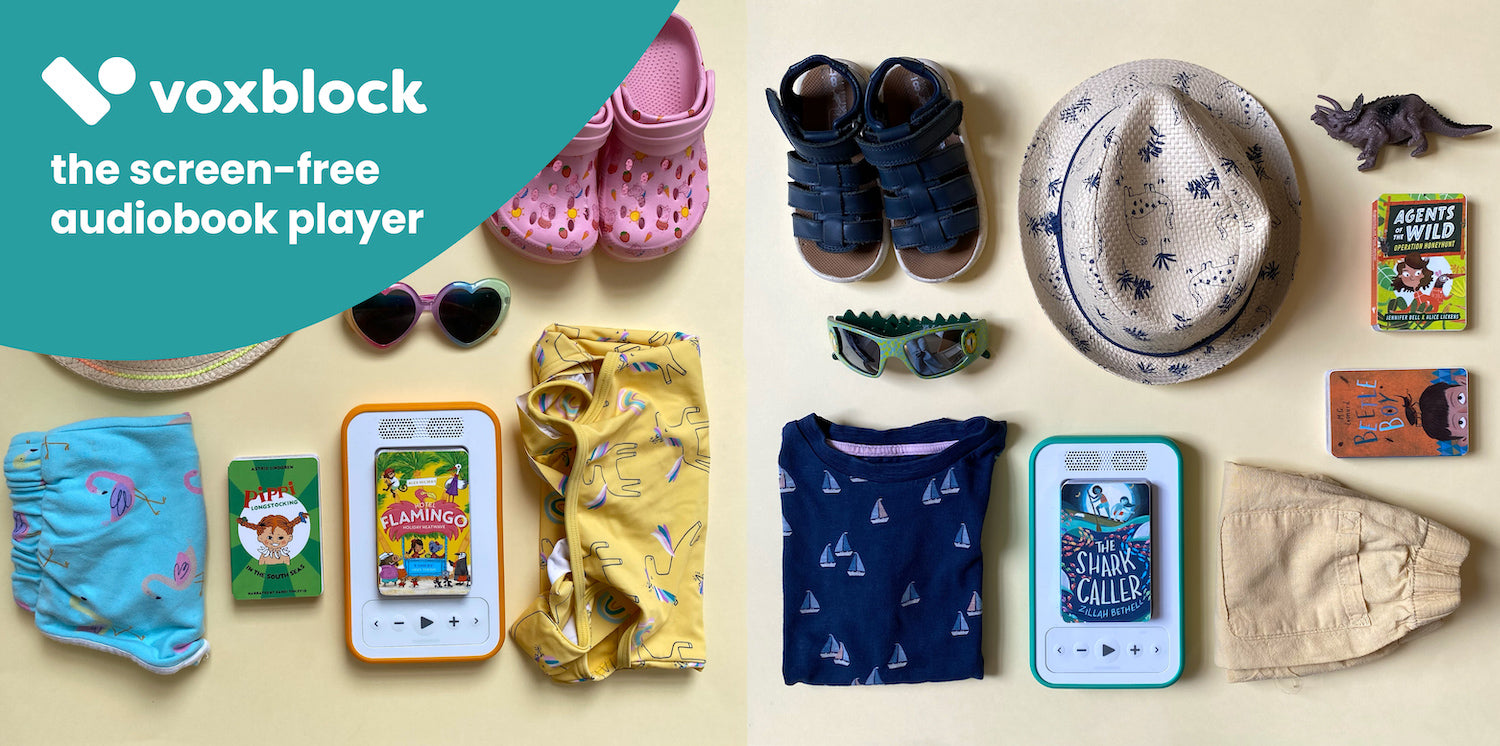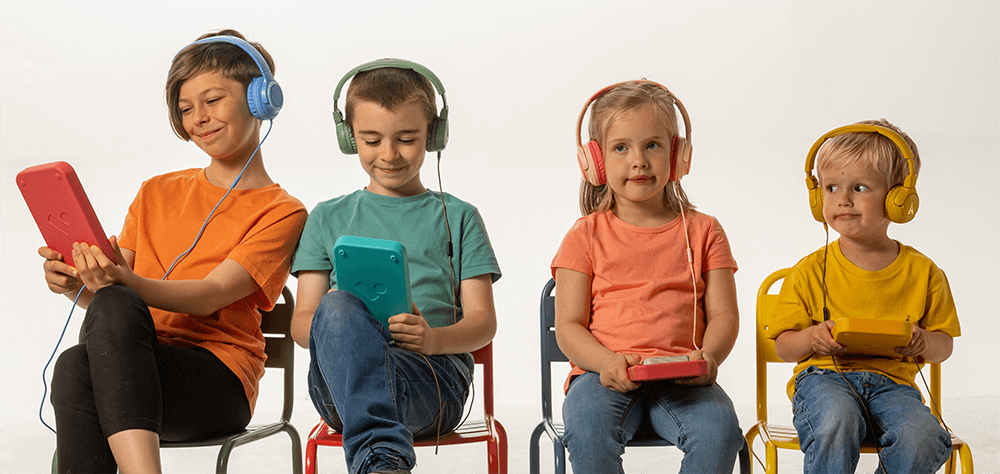Are Audiobooks as Effective as Reading Printed Books
At Voxblock we love audiobooks and think they are really important to developing literacy in children. So much so that we have made a new screen-free format for listening. We also get asked a lot of questions about why we think audiobooks are this important. So we thought we would have a go at answering some common questions people ask about audiobooks.
We have compiled a list of the most common questions people ask about audiobooks, covering various genres, and try to provide an answer based on our experience. Combining feedback from our own customers when considering buying Voxblock and search suggestions from Google gives an insight into the sorts of questions people are asking when considering the benefits of audiobooks and the variety of voices available.
Listening to audiobooks compared to reading a book.
One common type of question centres around comparing listening to audiobooks to reading a book. Many questions are about the relative merits of reading and listening to a book trying to establish if one is better than the other.
Audiobook vs reading
Jumping straight in with a very big question indeed: Audiobooks versus reading! Taking the Miriam Webster definition of versus to mean “in contrast to, as an alternative of”, lets start by looking at the contrast between the two formats. What are the differences and how do listening and reading achieve the same things?
Audiobooks versus physical books
As much as the literary content is the same in both a book and an audiobook, there are obvious contrasts between the two formats, not least the fact that content of one enters via the front of your face whereas the other goes in the sides.
However the most important difference, for us at least, is the tangibility physical books provide. A tangibility that is mostly missing from audiobooks (Voxblock is a new physical format for audiobooks that brings this back again). For us tangibility does not just mean something to touch, but also a physical embodiment of the contents of the book. Books occupy their place on bookshelves and sit as a physical reminder of the content contained between the front and back covers. The act of reading a book is a precursor to the generation of thoughts and feelings (hopefully) created by the written content. These thoughts and feelings remain with the reader often long after the final page is closed, and the physical presence of the book on a bookshelf can act to prolong and maintain these thoughts in the reader’s mind, extending the impact of the thoughts and emotion created by the author's words well beyond the time spent in the act of reading.
Having a physical object rather than a digital service means the content lends itself to gifting and swapping in a rather more satisfying way than can be achieved with a digital download. One of our biggest sellers is the Voxblock Gift Pack which underlines the pleasure of giving a physical rather than digital gift.
Most common formats of audiobooks no longer have this physical presence (once they did in a previous era of vinyl, cassette tapes and CDs), and are now reduced to an immaterial icon, a download on a digital device, a subscription, a simple rank on a playlist. There are many valid reasons for this evolution of audiobooks, that suited a mostly a tech-using demographic but the very real advantages of a physical tangibility were no longer part of the audiobook experience until the arrival of Voxblock.
Audiobook vs reading speed
A simple answer to this question would be that as reading speed is higher than listening speed, you can read a book faster than you can listen to it. On average a comfortable listening speed of humans is about 150 words per minute (wpm). The fastest we can listen and comprehend is about 300 wpm. We usually read at about 200 to 400 wpm. Most experienced readers can read at 800 to 1000 wpm. So one simplistic conclusion could be, if speed is your goal then read a book rather than listen to it.
However, once you start to consider the length of time you can sustain either activity the balance starts to change. Even reading a book at a leisurely pace, it is difficult to maintain this pace over a long period of time, as eyes tire, the mind wanders, and the arms holding the book need to shift.
In any case, the whole notion of speed, with the presumption faster being better, is a very shaky basis on which to make a case for either mode of consuming a book. The implicit suggestion is that reading or listening to a book is something to be gotten out of the way, done as quickly as possible so you can move on to the next title. Sometimes speed may indeed be a benefit (late night studying for a deadline!) but it seems to us that comprehension, retention and enjoyment should be more important factors than at least need to be included when considering speed.
So on the question of listening versus reading speed, although the speed of consumption at any given instant could be around the same, we don’t consider this a good way of judging the merits of either. But if for some reason (you have a tight study deadline, there is plenty of research around this)
Audiobooks versus printed books
Being digital brings some big advantages to publishers especially if they are providing downloads or streaming the content. Once the audiobook has been created and made into a digital file the incremental cost of scaling sales is small compared to the need to buy more paper and ink to sell more physical books that need shipping to shops on the high street. A digital format opens the way to global distribution in a way that a physical format can not match.
Accurately comparing the total environmental cost of a large volume of downloads or streaming versus an also large volume of books is a tricky task and beyond scope here, and has been the subject of news, claims and studies.
A wider difference is the notion of ownership. It feels pretty intuitive to answer the question for a book. You buy the book and you own it. If you want to give it away, and resell it to someone else its pretty straightforward. If you move house you can take your library with you.
However the same straightforward answers can not be so easily found for digital formats. Its pretty simple as long as you remain invested, and by ‘invested’ perhaps read ‘paying the monthly subscription’ to, one service or another, your audiobooks are available. But even the ones that allow you to keep a copy of the files after you cancel your subscription (Audible - does sometimes and even then they are still encrypted) its not always easy to keep the files and transfer a large amount of data from one device to another.
The approach we have taken with Voxblock is to make our stories come on physical blocks that require no downloads, a physical block that contains the audio ready to play. It can sit on your bookshelf ready to play and should you have finished listening to it you can swap it with someone else, sell it, give it away, or hold on to it for the next generation.
Audiobooks and reading
The evidence is clear: Audiobooks and reading are complementary, mutually supportive activities and listening to audiobooks can support reading. The National Literacy Trust goes on to say that “Audiobooks can be the key to unlocking a child’s love of reading.”
This is a key benefit of audiobooks for us at Voxblock, especially relevant when looking to develop literacy in children across different genres. Not only are audiobooks a vast resource of entertainment for children, but also when provided in the right way, hit that parental sweet spot of something children love doing whilst also providing significant educational benefits.
Audiobooks and podcasts offer a valuable opportunity to enhance reading comprehension, thanks to the engaging voices that narrate them. With expertly narrated and engaging performances, they breathe life into stories, immersing listeners in diverse realms. Audiobooks are particularly beneficial for comprehending complex texts and lengthy novels. They not only unlock the secrets of challenging material but also enhance fluency and pronunciation, especially in children. By listening to the natural rhythm of well-articulated sentences, individuals can absorb patterns and develop greater proficiency in reading aloud.
Audiobook or physical book
So should you listen to audiobooks or read a physical book? The diverse voices in audiobooks can bring unique perspectives to the text. At Voxblock we feel that one is not a replacement for the other despite many people seeing it as a zero-sum game: you either read or listen, it is clear that both formats provide a means to consume the ideas and thoughts of the author. Perhaps the question “audiobook or physical book” is akin to asking is a car better than a motorbike? Both are indeed modes of transport, both get you to the same destination, but each could leave you feeling slightly different when you get there.
At Voxblock we recognise more than most not only the benefits of audio but also the importance of a physical representation of the content that traditionally printed books provide more than audiobooks, which is why in producing our “Audiobooks for Bookshelves” we feel we have produced a new format for audiobooks that builds on (or reintroduces, depending on how long your memory is) the benefits of physical to an audio product.
Are audiobooks as good as reading?
Another type of question that gets asked is around the value or worth of listening to audiobooks compared to reading a book.
The suspicion that audiobooks may not be as good as reading stems from several factors, although opinions on this matter can vary widely among individuals. Here are some common reasons why some people may be sceptical of audiobooks:
Audiobooks can significantly enhance vocabulary and comprehension skills, offering a valuable supplement to traditional reading.
Comprehension and Retention: Some people believe that when you read a physical book, you are more likely to comprehend and retain the information better than when listening to an audiobook. The act of visually processing the text and engaging with the material may lead to a deeper understanding and memory of the content.
Distractions and Multitasking: Critics of audiobooks argue that listening to a book while performing other tasks, such as driving, exercising, or doing household chores, may lead to distractions and reduced focus on the content. They suggest that dedicated reading time allows for a more immersive experience.
Pacing and Speed: When reading, individuals have the freedom to control the pace at which they consume the content. Some may prefer to read slowly and savour the details, while others might speed up during less engaging sections. Audiobooks, on the other hand, follow a predetermined narration pace, which might not match the preferred speed of all listeners.
Personal Connection: Some readers feel a stronger personal connection to a book when they physically hold it, turn the pages, and experience the tactile sensations of reading. Audiobooks can sometimes feel less intimate and more distant, lacking the tangible connection.
Perhaps these questions arise from falsely comparing two distinct activities and a desire to have one come out on top as somehow better to support a personal preference. At Voxblock we are big fans of both and wholeheartedly consider audiobooks to be an independent and often complementary activity that develops literacy in its own right and also supports other forms of literacy especially in children.
Are audiobooks cheating?
This concern suggests that somehow listening confers an unfair advantage, in some strange sort of a race to absorb the content. Any unfair advantage could be considered cheating, so people might be suspicious that audiobooks are cheating. There is not a race to read so the premise is wrong, the notion of cheating others is wrong. What about cheating yourself? Could cheating be understood in a sense of being denied something? Does listening cheat you of the full experience that a book has to offer and thus listening to an audiobook is cheating, denying you all the author is offering you? It is clear to us at least that audiobooks complement reading perfectly and the means of consumption does not trump the content. The physical aspects of Voxblocks format blend nicely the positives that these two formats have to offer.
Audiobooks are not reading?
Once again the concern behind this question seems to be that somehow consuming an audiobook is inferior to consuming a book. Clearly the act of reading is not the same as the act of listening, so perhaps a more useful question to ask is: Is the outcome the same from reading and listening to a book? If the outcome is the same then it could be suggested that distinguishing between reading and listening is like distinguishing between hardback and paperback. It seems unlikely that the format, hardback or paperback, has an impact on the outcome for the reader of the book. So if the outcome of listening and reading is the same then should not audiobooks and books be seen in the same way, suggesting that listening to audiobooks is reading.
Audiobook like reading
Now we are getting somewhere, at last a more positive question. Taking this snippet found in Google searches, to mean the assertion “[listening to an] audiobook is like reading”, we wholeheartedly agree that both are very beneficial ways of enjoying the content that an author wishes to share.
Are audiobooks better than reading?
Could it even be that audiobooks are not some diminished version of reading as some people worry but a new way that changes how a person can consume literature in a meaningful way. Perhaps reading is the bottleneck, the brake on the potential of a child’s literacy. Can you listen more than you can read? As suggested above, although slower in some cases, it might be easier to listen to more content than you can read. Today's definition of a well-read person is based on the amount of time it takes to read a book. Perhaps tomorrow it will be based on the amount of books you can listen to, in the same way as a well-travelled person is no longer defined by the distance you can travel on horse but plane.
Conclusion
By examining the sorts of questions that people ask themselves with regards to audiobooks we can see some of the concerns or hesitations that people have. We hope that a slightly light-hearted look at these has perhaps convinced you that audiobooks have a large role to play in the more serious task of developing children's literacy, which is at the core of what we do at Voxblock.
At Voxblock our mission is to make a positive contribution to the development of children's literacy through the increased use of audiobooks by a wider number of children. By making a new format that builds on the vast audiobook resources already available whilst incorporating the key physical aspects that books have we believe that we can expand the role of audiobooks in improving literacy in children.





